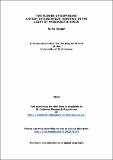'The flower of suffering' : a study of Aeschylus' Oresteia in the light of Presocratic ideas
Abstract
My PhD thesis, The Flower of Suffering, offers a philosophical evaluation of Aeschylus’
Oresteia in light of Presocratic ideas. By examining several aspects of the tragic trilogy in
relation to some of Aeschylus’ near-contemporary thinkers, it aims to unravel the
overarching theological ideas and the metaphysical and epistemological assumptions
underpinning the Oresteia’s dramatic narrative. My aim is to bring to relief those aspects of
the Oresteia which I believe will benefit from a comparison with some ideas, or modes of
thought, which circulated among the Presocratic philosophers. I will explore how reading
some of this tragedy’s themes in relation to Presocratic debates about theology and cosmic
justice may affect and enhance our understanding of the theological ‘tension’ and
metaphysical assumptions in Aeschylus’ work. In particular, it is my contention that
Aeschylus’ explicit theology, which has been often misinterpreted as a form of theodicy
where the justice of heaven is praised and a faith in the rule of the gods is encouraged, is
presented in these terms only to create a stronger collision with the painful reality dramatized
from a human perspective.
By setting these premises, it is my intention to confer on Greek tragedy a prominent position
in the history of early Greek philosophical thought. If the exclusion of Presocratic material
from debates about tragedy runs the risk of obscuring a thorough understanding of the
broader cultural backdrop against which tragedy was born, the opposite is also true. Greek
tragedy represents, in its own dramatic language, a fundamental contribution to early
philosophical speculation about the divine, human attitudes towards it, indeed, the human
place in relation to the cosmic forces which govern the universe.
Type
Thesis, PhD Doctor of Philosophy
Collections
Items in the St Andrews Research Repository are protected by copyright, with all rights reserved, unless otherwise indicated.

